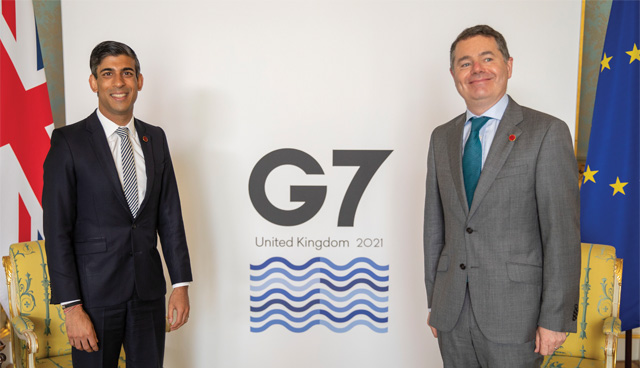OECD tax proposals: Ireland an outlier

In July 2021, Ireland became one of eight countries, out of a total of 139, which did not endorse an Organisation for Economic Co-operation and Development (OECD) agreement on a global minimum effective tax rate. The Department of Finance has now launched a public consultation on the proposals ahead of a final agreement in October.
Since 2003, Ireland has upheld a corporate tax rate of 12.5 per cent, subsequently establishing itself as the European base for many US technology and pharmaceutical corporations.
In June 2021, the G7 — or Canada, France, Germany, Italy, Japan, the United States, and the UK — endorsed a 15 per cent minimum rate of corporation tax. The following month, 131 countries agreed to back the OECD Inclusive Framework.
The OECD Inclusive Framework is a two-pillar solution to address tax challenges arising from digitalisation and globalisation. Pillar One seeks to reallocate a proportion of tax to the market jurisdiction and Pillar Two proposes a global minimum effective tax rate. A comprehensive agreement is set to be reached in October 2021.
While the Government acknowledges that Pillar One will reduce Ireland’s corporation tax receipts, overall, it argues that the stability and certainty it will provide to the international tax framework will be beneficial in underpinning economic growth. As such, it fully supports these proposals.
However, while expressing “broad support” for the Pillar Two proposals, the Department of Finance has expressed reservations about “the proposed minimum effective tax rate of ‘at least 15 per cent’”. As a result, Ireland, the Department says, “is not in a position to join the consensus”.
Minister for Finance Paschal Donohoe TD remarked: “I have consistently spoken of my desire for a comprehensive, sustainable and equitable agreement on the international tax rules at the OECD that meet the needs of all countries, large and small, developed and developing.
“I was not in a position to join the consensus on the agreement and specifically a global minimum effective tax rate of ‘at least 15 per cent’ today. I have expressed Ireland’s reservation but remain committed to the process and aim to find an outcome that Ireland can yet support. Ireland will continue to play our part in reaching a comprehensive and, indeed, historic agreement.”
Subsequently, in late July, the Minister for Finance launched a public consultation on the OECD international tax proposals.
Upon its launch, the Department of Finance reiterated Ireland’s “broad support” for the agreement while expressing reservations about “the proposed minimum effective tax rate of ‘at least 15 per cent’”.
The Department intends that the consultation, which is open until 10 September 2021, will help identify challenges and opportunities of the OECD proposals “in respect of Ireland’s corporate tax code and broader industrial policy”.
Emphasising that while agreement on the OECD Inclusive Framework was reached on 1 July 2021, it was not unanimous on key aspects.
Ireland has been clear in expressing our broad support for the agreement but have expressed our reservation in particular about the proposed global minimum effective tax rate of ‘at least 15 per cent’.
Given the importance of the OECD proposals, it is timely to invite views through a public consultation on the OECD proposals. The consultation will be helpful in identifying the challenges and opportunities of the proposals in respect of Ireland’s corporate tax code and broader industrial policy.
Minister Donohoe said: “I believe it is in the interest of all concerned to achieve an equitable, ambitious and sustainable agreement at the OECD on the international tax architecture. It is essential as we emerge from the Covid-19 pandemic that the international tax system provides the necessary certainty and stability to support growth and investment, and Ireland is committed to playing our part in reaching the comprehensive agreement.”
Whether Ireland can be persuaded to endorse the proposals remains to be seen.





